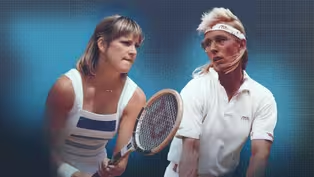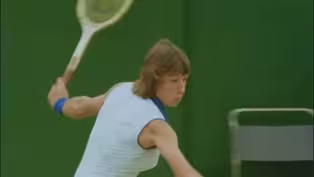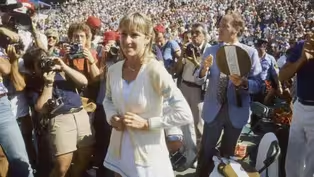
Martina Navratilova: Accepted
Clip: Episode 3 | 3m 4sVideo has Closed Captions
Martina Navratilova recounts her first match as an American citizen and openly gay athlete.
Facing Tracy Austin at the 1981 US Open, Martina Navratilova plays her first match as an American citizen and openly gay athlete. Despite the loss, Navratilova receives a resounding ovation from the crowd, a powerful display of love and acceptance that transcends the outcome of the game.
Problems playing video? | Closed Captioning Feedback
Problems playing video? | Closed Captioning Feedback

Martina Navratilova: Accepted
Clip: Episode 3 | 3m 4sVideo has Closed Captions
Facing Tracy Austin at the 1981 US Open, Martina Navratilova plays her first match as an American citizen and openly gay athlete. Despite the loss, Navratilova receives a resounding ovation from the crowd, a powerful display of love and acceptance that transcends the outcome of the game.
Problems playing video? | Closed Captioning Feedback
How to Watch Gods of Tennis
Gods of Tennis is available to stream on pbs.org and the free PBS App, available on iPhone, Apple TV, Android TV, Android smartphones, Amazon Fire TV, Amazon Fire Tablet, Roku, Samsung Smart TV, and Vizio.
Providing Support for PBS.org
Learn Moreabout PBS online sponsorship♪ Margolyes: The fact that she was forced to come out was an act of supreme bullying by the newspapers that threatened her.
In the eighties, it was very harsh.
The climate for gay people was harsh.
Tennis people didn't care if you were gay or not, but the country cared.
Uh, it was definitely not a-- not a good thing.
[Cheering, whistling, and applause] Narrator: The 1981 U.S. Open would be Navratilova's first tournament on U.S. soil, both as a new American citizen and since being outed.
She faced 18-year-old Tracy Austin, who, two years earlier, had broken the record as the tournament's youngest-ever winner.
♪ Martina had never won a U.S. Open, she had just become a U.S. citizen.
When she came out, Martina had a lot going on off the court.
[Whistling and applause] Martina wins the first set.
I won the second set, and there were already tears in her eyes.
She was already kind of gone mentally.
[Applause and whistling] Long story short, she lost 7-6 in the third set, and I won my second U.S. Open.
[Applause and whistling] So, for me, it was a real triumph, and for her, anybody's gonna be very disappointed when you lose 7-6 in the third for a Grand Slam title.
[Cheering and applause] Barker: We all felt for her because of everything that she had been through.
None of us could understand the emotions and everything that she was feeling.
Man: Martina Navratilova, come forward, please.
[Cheering, whistling, and applause] Navratilova: When they announce me to get the runner-up trophy... [Cheering and whistling continue] ♪ you know, the people kept clapping and they kept clapping and they kept clapping.
Shriver: The crowd roared.
Standing ovation.
♪ Austin: The crowd embraced her.
It was--it was really wonderful.
That was the first time, I think, Martina ever felt overwhelming love of a crowd, and it-- she just broke down.
[Cheering, whistling, and applause] ♪ ♪ Navratilova: I didn't cry because I lost the match.
I cried because I felt I was accepted.
I always wanted to belong, right?
And now I'm a citizen and I'm gay and they're still clapping.
[Applause and whistling] ♪
Video has Closed Captions
Preview: Ep3 | 30s | Martina Navratilova dominates Wimbledon but struggles to be as adored as her rival, Chris Evert. (30s)
Video has Closed Captions
Clip: Ep3 | 1m 26s | The fiery Martina Navratilova disrupts the tranquil world of tennis. (1m 26s)
Video has Closed Captions
Clip: Ep3 | 3m 30s | Chris Evert versus Martina Navratilova at the 1978 Wimbledon Championship. (3m 30s)
Providing Support for PBS.org
Learn Moreabout PBS online sponsorshipSupport for PBS provided by:


















